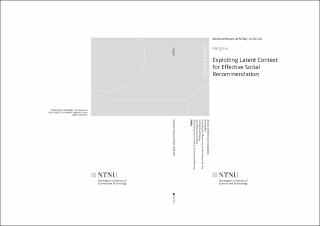| dc.description.abstract | With the rapid proliferation of online social networks, the information overload problem becomes increasingly severe, and recommender systems play a critical role in helping online users discover useful information matching their individual preferences. Significant recommendation researches have focused on the explicit context such as time, location and weather etc. Despite effectiveness, obtaining explicit contexts is usually a resource-demanding task, and it is not always available in real-world recommender systems. In contrast, the latent contexts, which could be learned automatically from raw data by applying machine learning techniques, are much easier to obtain but lack of comprehensive study. Moreover, the cold start issue and the special properties of social networks, such as multilingualism, rich temporal dynamics, heterogeneous and complex structures with millions of nodes, render the most commonly used recommendation approaches (e.g. Collaborative Filtering) inefficient. Therefore, in this thesis, we investigate the latent contexts provided by three prevalent sources in the social network for effective social recommendation: (i) user-generated reviews, (ii) social links and (iii) multimedia data.
To begin with, user-generated reviews have been seen as a valuable information source to build a fine-grained user preference model and enhance personalized recommendation. First, we propose a probabilistic generative model (DTSA) to extract topics and topic-specific sentiments from textual reviews and analyze their evolution over time simultaneously. To further explore the contextual information the DTSA neglects, and multilingual resources in social media, we then devise a multilingual review-aware deep recommendation model which can not only extract aligned aspects and their associated sentiments in different languages, but also leverage the extracted information as multilingual contexts for overall rating prediction and item recommendation.
Furthermore, social links indicate different types of social connections associated with users and/or items, which form a heterogeneous user-item (HUI) network. To address the issues of temporal dynamics, cold start and context awareness in the social recommender system, we propose a dynamic graph-based embedding model (DGE) that jointly captures the temporal semantic effects, social relationships and user behaviour sequential patterns in a unified way by embedding the HUI network into a shared low dimensional space. Considering the global pattern of vertices, we then extend our DGE model by incorporating the community information derived from network structure into graph embedding model for social recommendation.
Last but not least, visual information considered as an essential part of multimedia data can also be a significant complementary resource when performing recommendations for some types of items such as movies, clothing, etc. To fully exploit visual contexts, we propose an Attentive Recurrent Neural Network (Ante-RNN) for the dynamic explainable recommendation which could provide multi-model explanations according to the user dynamic preference. We further analyze and study a variety of fusion strategies for mutual association learning across modalities, and find that the attention-based fusion robustly achieves the best results.
By performing extensive experiments on real-world datasets from social networks, our proposed methods outperform the competitive baselines including cold-start scenario both in efficiency and effectiveness. | en_US |
